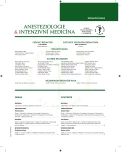-
Medical journals
- Career
Metabolic consequences of bowel damage in intensive care
Authors: Z. Zadák; A. Tichá; R. Hyšpler
Authors‘ workplace: Centrum pro výzkum a vývoj, Fakultní nemocnice Hradec Králové
Published in: Anest. intenziv. Med., 27, 2016, č. 1, s. 19-24
Category: Intensive Care Medicine - Review Article
Overview
The role of the bowel function in intensive care has for a long time been underestimated, but the metabolic or barrier function failure can have potentially fatal consequences. This review summarises the major causes and effects of functional and metabolic bowel damage with emphasis on critical care. The dominant factors are intestinal hypoperfusion consequent to systemic hypotension, restriction of blood flow in the mesenteric area due to partial obstruction of the mesenteric arteries, inflammation, toxicity of xenobiotics to enterocytes, infectious agents, lack of nutrients, ionizing radiation and mechanical bowel damage. The necessary tests for possible comorbidities, which further deteriorate bowel function, and specific intestinal laboratory examinations are described. These include saccharide absorption tests and determination of D-lactate or intestinal fatty acid binding protein.
The basic options for nutritional improvement of the intestinal function are listed, namely minimal enteral nutrition, the current recommendations for prevention of intestinal damage in critical care and the cholinergic vagal stimulation concept using choline precursors. Adherence to such regimens facilitates restoration or maintenance of the gut function.Keywords:
gut barrier – multiorgan failure – intestinal fatty acid binding protein – sepsis – re-feeding
Sources
1. Dob, G. J. Focus on: Gut and nutritional failure in the critically ill – The role of the gut in critical illness. Current Anaesthesia and Critical Care, 1996, 7, p. 62–68.
2. Mittal, R., Coopersmith, C. M. Redefining the gut as the motor of critical illness. Trends in Molecular Medicine, 2014, 20, p. 214–223.
3. Shi, H., Wu, B., Wan, J., Liu, W., Su, B. The role of serum intestinal fatty acid binding protein levels and D-lactate levels in the diagnosis of acute intestinal ischemia. Clinics and Research in Hepatology and Gastroenterology, 2015, 39, p. 373–378.
4. Ridlon, J. M., Bajaj, J. S. The human gut sterolbiome: bile acid-microbiome endocrine aspects and therapeutics. Acta Pharmaceutica Sinica B, 2015, 5, p. 99–105.
5. Duca, F. A., Yue, J. T. Y. Fatty acid sensing in the gut and the hypothalamus: In vivo and in vitro perspectives. Molecular and Cellular Endocrinology, 2014, 397, p. 23–33.
6. Duan, R. D., Nilsson, A. Metabolism of sphingolipids in the gut and its relation to inflammation and cancer development. Progress in Lipid Research, 2009, 48, p. 62–72.
7. Zadák, Z. Výživa v intenzivní péči. 2. rozšířené aktuální vydání. Praha: Grada Publishing, 2008. ISBN 978-80-247-2844-5.
8. Zadák, Z., Havel, E. a kol. Intenzivní medicína na principech vnitřního lékařství. 1. vydání. Praha: Grada Publishing, 2007. ISBN 978-80-247-2099-9.
9. Sun, Z., Lasson, A., Olanders, K., Deng, X., Andersson, R. Gut barrier permeability, reticuloendothelial system function and protease inhibitor levels following intestinal ischaemia and reperfusion – effects of pretreatment with N-acetyl-L-cysteine and indomethacin. Digest Liver Dis, 2002, 34, p. 560–569.
10. Hackam, D. J., Good, M., Sodhi, Ch. P. Mechanisms of gut barrier failure in the pathogenesis of necrotizing enterocolitis: Toll-like receptors throw the switch. Seminars in Pediatric Surgery, 2013, 22, p. 76–82.
11. Kohout, P., Cerman, J., Brátová, M., Zadák, Z. Small Bowel Permeability in Patients With Cytostatic Therapy. Nutrition, 1999, 15, p. 546–549.
12. Qin, X., Deitch, E. A. Dissolution of lipids from mucus: A possible mechanism for prompt disruption of gut barrier function by alcohol. Toxicology Letters, 2015, 232, p. 356–362.
13. Deitch, E. A. Gut-origin sepsis: Evolution of a concept. The Surgeon, 2012, 10, p. 350–356.
14. Shaikh, M., Rajan, K., Forsyth, Ch. B., Voigt, R. M., Keshavarzian, A. Simultaneous gas-chromatographic urinary measurement of sugar probes to assess intestinal permeability: Use of time course analysis to optimize its use to assess regional gut permeability. Clinica Chimica Acta, 2015, 442, p. 24–32.
15. Gordon, J. I., Lowe, J. B. Analyzing the structures, functions and evolution of two abundant gastrointestinal fatty acid binding proteins with recombinant DNA and computational techniques. Chem. Phys. Lipids, 1985, 38, p. 137–158.
16. Evennett, N. J., Petrov, M. S., Mittal, A. Systematic Review and Pooled Estimates for the Diagnostic Accuracy of Serological Markers for Intestinal Ischemia. World J. Surg., 2009, 33, p. 1374–1383.
17. Dhawan, S., Cailotto, C., Harthoorn, L. F., de Jonge, W. J. Cholinergic signalling in gut imunity. Life Sciences, 2012, 91, p. 1038–1042.
Labels
Anaesthesiology, Resuscitation and Inten Intensive Care Medicine
Article was published inAnaesthesiology and Intensive Care Medicine

2016 Issue 1-
All articles in this issue
- Perioperative monitoring of blood glucose levels in paediatric patients
- Initial experience with adenosin-induced circulatory arrest during cerebral artery aneurysm surgery – first experience
- Metabolic consequences of bowel damage in intensive care
- Consciousness as a cosmic phenomenon
- Transcranial Doppler and brain death
- Evaluation of Patients With Suspected Acute Pulmonary Embolism: Best Practice Advice From the Clinical Guidelines Committee of the American College of Physicians
- The Loss of Chance Doctrine and current changes in the practice and views of courts of justice on the principles of causality and causal link in civil medico-legal proceedings
- Anaesthesiology and Intensive Care Medicine
- Journal archive
- Current issue
- Online only
- About the journal
Most read in this issue- Metabolic consequences of bowel damage in intensive care
- Initial experience with adenosin-induced circulatory arrest during cerebral artery aneurysm surgery – first experience
- Consciousness as a cosmic phenomenon
- Evaluation of Patients With Suspected Acute Pulmonary Embolism: Best Practice Advice From the Clinical Guidelines Committee of the American College of Physicians
Login#ADS_BOTTOM_SCRIPTS#Forgotten passwordEnter the email address that you registered with. We will send you instructions on how to set a new password.
- Career

